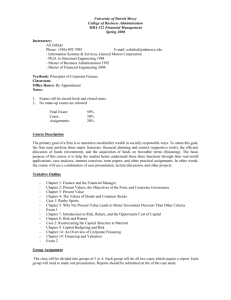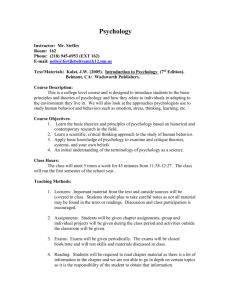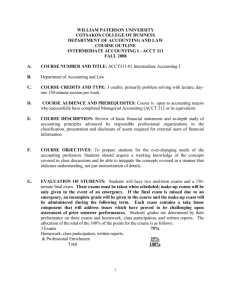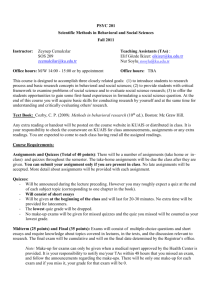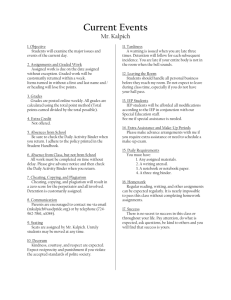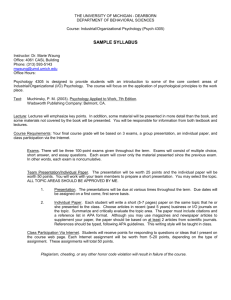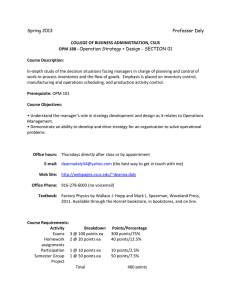Introduction to Psychology
advertisement
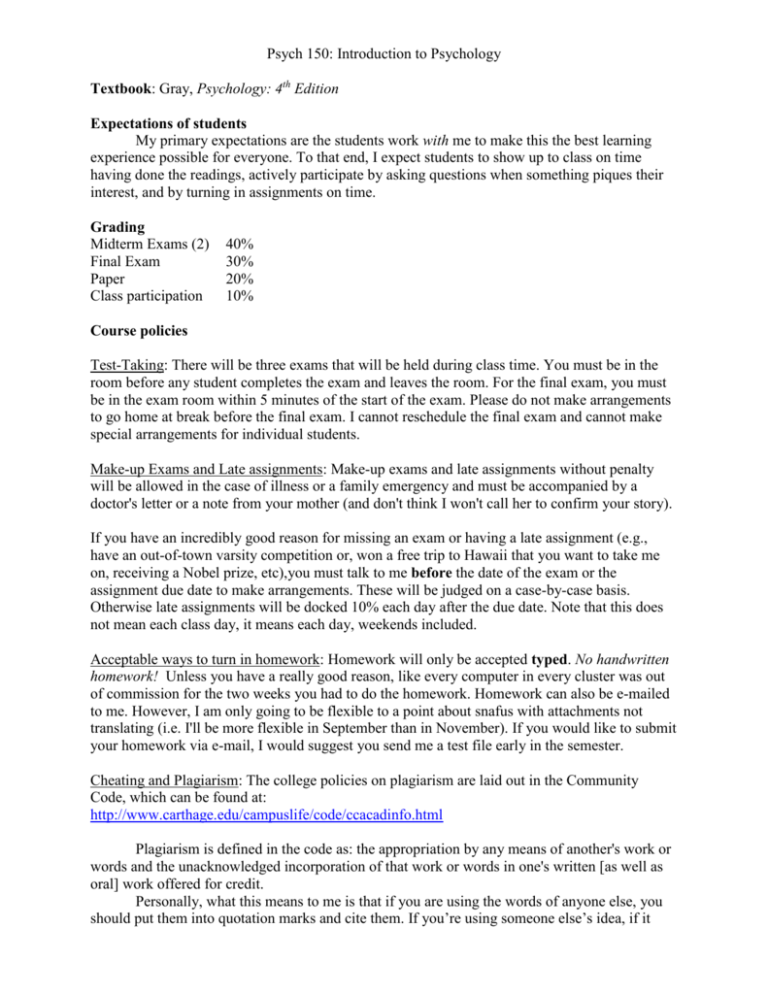
Psych 150: Introduction to Psychology Textbook: Gray, Psychology: 4th Edition Expectations of students My primary expectations are the students work with me to make this the best learning experience possible for everyone. To that end, I expect students to show up to class on time having done the readings, actively participate by asking questions when something piques their interest, and by turning in assignments on time. Grading Midterm Exams (2) Final Exam Paper Class participation 40% 30% 20% 10% Course policies Test-Taking: There will be three exams that will be held during class time. You must be in the room before any student completes the exam and leaves the room. For the final exam, you must be in the exam room within 5 minutes of the start of the exam. Please do not make arrangements to go home at break before the final exam. I cannot reschedule the final exam and cannot make special arrangements for individual students. Make-up Exams and Late assignments: Make-up exams and late assignments without penalty will be allowed in the case of illness or a family emergency and must be accompanied by a doctor's letter or a note from your mother (and don't think I won't call her to confirm your story). If you have an incredibly good reason for missing an exam or having a late assignment (e.g., have an out-of-town varsity competition or, won a free trip to Hawaii that you want to take me on, receiving a Nobel prize, etc),you must talk to me before the date of the exam or the assignment due date to make arrangements. These will be judged on a case-by-case basis. Otherwise late assignments will be docked 10% each day after the due date. Note that this does not mean each class day, it means each day, weekends included. Acceptable ways to turn in homework: Homework will only be accepted typed. No handwritten homework! Unless you have a really good reason, like every computer in every cluster was out of commission for the two weeks you had to do the homework. Homework can also be e-mailed to me. However, I am only going to be flexible to a point about snafus with attachments not translating (i.e. I'll be more flexible in September than in November). If you would like to submit your homework via e-mail, I would suggest you send me a test file early in the semester. Cheating and Plagiarism: The college policies on plagiarism are laid out in the Community Code, which can be found at: http://www.carthage.edu/campuslife/code/ccacadinfo.html Plagiarism is defined in the code as: the appropriation by any means of another's work or words and the unacknowledged incorporation of that work or words in one's written [as well as oral] work offered for credit. Personally, what this means to me is that if you are using the words of anyone else, you should put them into quotation marks and cite them. If you’re using someone else’s idea, if it you’re not putting it into exactly their words, you should give them credit. Anything that doesn’t come from your own mind should be attributed to the source it came from. Anything. Consider this your first warning. Any student who is found cheating or plagiarizing on any work for this course will receive no credit for that work. Further action will also be taken if necessary or if the transgression is deemed egregious enough. Course schedule Here is an approximate schedule of events for the semester. We’ll stick as closely to it as possible, but I make no promises. Date Topic Reading UNIT 1: Who are we? 9/6-9/8 Introduction – What is Psychology? Chapter 1 9/11-15: 9/18-20: 9/22-25: 9/27-10/2: 10/4-6: Personality & Emotion Social Perception Social Behavior Learning Motivation Chapter 15; Chapter 6: 220-230 Chapter 13 Chapter 14 Chapter 4 Chapter 6: 187-208 10/9: EXAM 1 UNIT 2: How Do We Think? 10/11-13: 10/16-18: 10/20-27: 10/30-11/1: 11/3: 11/6: 11/8: 11/10-13: Neurons and neural computations Chapter 5 Non-visual perception Chapter 7 Visual perception Chapter 8 Attention Chapter 9: 303-315 Working Memory Chapter 9: 315-319 Long-term memory Chapter 9: 319-338 Semantic memory – How we know what we know. Problem Solving & Decision Making Chapter 10 11/15: EXAM 2 UNIT 3: What happens when things go wrong? 11/27-29: 12/1-12/8: 12/11: Cognitive Development Mental Disorders Therapy & Treatment Chapter 11 Chapter 16 Chapter 17 FINAL EXAM: Friday, December 15 – 1:30-3:30. Everyone MUST attend the final exam. No exceptions. No rescheduling.
